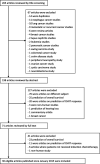Predictive Biomarkers for Response and Toxicity of Induction Chemotherapy in Head and Neck Cancers
- PMID: 35875133
- PMCID: PMC9299243
- DOI: 10.3389/fonc.2022.900903
Predictive Biomarkers for Response and Toxicity of Induction Chemotherapy in Head and Neck Cancers
Abstract
This review focuses on the molecular biology of head and neck squamous cell carcinomas and presents current and emerging biomarkers of the response of patients to induction chemotherapy. The usefulness of genes, proteins, and parameters from diagnostic clinical imaging as well as other clinicopathological parameters is thoroughly discussed. The role of induction chemotherapy before radiotherapy or before chemo-radiotherapy is still debated, as the data on its efficacy are somehow confusing. Despite the constant improvement of treatment protocols and the introduction of new cytostatics, there is still no consensus regarding the use of induction chemotherapy in the treatment of head and neck cancer, with the possible exception of larynx preservation. Such difficulties indicate that potential future treatment strategies should be personalized. Personalized medicine, in which individual tumor genetics drive the selection of targeted therapies and treatment plans for each patient, has recently emerged as the next generation of cancer therapy. Early prediction of treatment outcome or its toxicity may be highly beneficial for those who are at risk of the development of severe toxicities or treatment failure-a different treatment strategy may be applied to these patients, sparing them unnecessary pain. The literature search was carried out in the PubMed and ScienceDirect databases as well as in the selected conference proceedings repositories. Of the 265 articles and abstracts found, only 30 met the following inclusion criteria: human studies, analyzing prediction of induction chemotherapy outcome or toxicity based on the pretreatment (or after the first cycle, if more cycles of induction were administered) data, published after the year 2015. The studies regarding metastatic and recurrent cancers as well as the prognosis of overall survival or the outcome of consecutive treatment were not taken into consideration. As revealed from the systematic inspection of the papers, there are over 100 independent parameters analyzed for their suitability as prognostic markers in HNSCC patients undergoing induction chemotherapy. Some of them are promising, but usually they lack important features such as high specificity and sensitivity, low cost, high positive predictive value, clinical relevance, short turnaround time, etc. Subsequent studies are necessary to confirm the usability of the biomarkers for personal medicine.
Keywords: HNSCC (head and neck squamous cell carcinoma); biomarkers; induction chemotherapy; outcome; prediction; toxicity.
Copyright © 2022 Boguszewicz.
Conflict of interest statement
The authors declares that the research was conducted in the absence of any commercial or financial relationships that could be construed as a potential conflict of interest.
Figures
Similar articles
-
Evidence-based radiation oncology in head and neck squamous cell carcinoma.Radiother Oncol. 2007 Oct;85(1):156-70. doi: 10.1016/j.radonc.2007.04.002. Epub 2007 May 4. Radiother Oncol. 2007. PMID: 17482300 Review.
-
[Systemic therapy strategies for head-neck carcinomas: current status].Laryngorhinootologie. 2012 Mar;91 Suppl 1:S123-43. doi: 10.1055/s-0031-1297244. Epub 2012 Mar 28. Laryngorhinootologie. 2012. PMID: 22456917 Review. German.
-
Immunotherapy in Patients with Recurrent and Metastatic Squamous Cell Carcinoma of the Head and Neck.Anticancer Agents Med Chem. 2019;19(3):290-303. doi: 10.2174/1871520618666180910092356. Anticancer Agents Med Chem. 2019. PMID: 30198439 Review.
-
Head and neck cancer: Current challenges and future perspectives.Adv Cancer Res. 2021;152:67-102. doi: 10.1016/bs.acr.2021.05.002. Epub 2021 Jun 16. Adv Cancer Res. 2021. PMID: 34353444
-
PET monitoring of therapy response in head and neck squamous cell carcinoma.J Nucl Med. 2009 May;50 Suppl 1:74S-88S. doi: 10.2967/jnumed.108.057208. Epub 2009 Apr 20. J Nucl Med. 2009. PMID: 19380408 Review.
Cited by
-
In Vitro Models of Head and Neck Cancer: From Primitive to Most Advanced.J Pers Med. 2023 Nov 3;13(11):1575. doi: 10.3390/jpm13111575. J Pers Med. 2023. PMID: 38003890 Free PMC article. Review.
-
The role of molecular biomarkers in the diagnosis, prognosis, and treatment stratification of oral squamous cell carcinoma: A comprehensive review.J Liq Biopsy. 2025 Jan 4;7:100285. doi: 10.1016/j.jlb.2025.100285. eCollection 2025 Mar. J Liq Biopsy. 2025. PMID: 40027232 Free PMC article. Review.
-
Predicting Response to Exclusive Combined Radio-Chemotherapy in Naso-Oropharyngeal Cancer: The Role of Texture Analysis.Diagnostics (Basel). 2024 May 17;14(10):1036. doi: 10.3390/diagnostics14101036. Diagnostics (Basel). 2024. PMID: 38786334 Free PMC article.
-
Transcriptomic and Proteomic Profiles for Elucidating Cisplatin Resistance in Head-and-Neck Squamous Cell Carcinoma.Cancers (Basel). 2022 Nov 9;14(22):5511. doi: 10.3390/cancers14225511. Cancers (Basel). 2022. PMID: 36428603 Free PMC article.
-
Risk model-guided identification of MTDH expression as a marker for ferroptosis induction therapy in head and neck squamous cell carcinoma.Am J Cancer Res. 2023 Nov 15;13(11):5236-5253. eCollection 2023. Am J Cancer Res. 2023. PMID: 38058815 Free PMC article.
References
-
- Fayette J, Fontaine-Delaruelle C, Ambrun A, Daveau C, Poupart M, Ramade A, et al. . Neoadjuvant Modified TPF (Docetaxel, Cisplatin, Fluorouracil) for Patients Unfit to Standard TPF in Locally Advanced Head and Neck Squamous Cell Carcinoma: A Study of 48 Patients. Oncotarget (2016) 14 7(24):37297–304. doi: 10.18632/oncotarget.8934 - DOI - PMC - PubMed
Publication types
LinkOut - more resources
Full Text Sources
Research Materials
Miscellaneous


